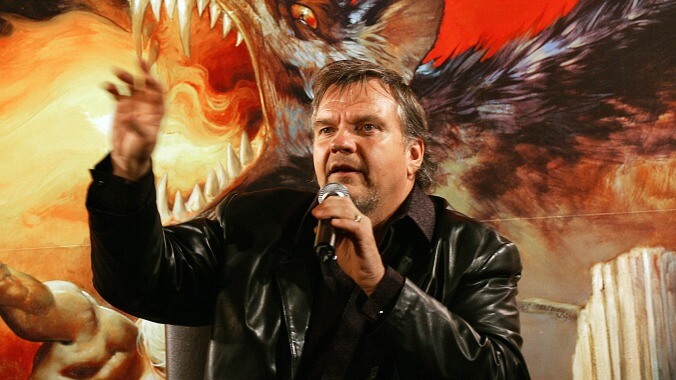R.I.P. Meat Loaf
The Bat Out Of Hell singer and Fight Club actor was 74

The singer and actor born Marvin Lee Aday, and better known to the worlds of both music and acting by his stage name Meat Loaf, has died. The Grammy winner, who pulverized sales records with his 1977 debut album Bat Out Of Hell, and who starred in films like The Rocky Horror Picture Show and Fight Club, was 74. Per Deadline, a cause of death has not been released.
Although he was already performing in bands from the age of 20 on (already using his distinctive stage name for “Meat Loaf Soul”), Meat Loaf got his first real success in musical theater—a medium that would influence many of the greatest triumphs of his career. A role in a Los Angeles production of Hair saw him transition into the musical’s Broadway cast…which in turn led to a gig with New York’s Public Theater, and a meeting with the man who’d be his collaborator, off and on, for the next several decades: Composer and songwriter Jim Steinman.
In Steinman, Meat Loaf found a partner who was musically fixated on many of the same topics he was: Sex, motorcycles, soaring guitar solos, sex again, and, above all, a particularly idiosyncratic version of “rock and roll” that pulled as much from showtunes as it did more traditional sounds. In Meat Loaf, meanwhile, Steinman found a voice that could power the ascendant melodies that had been kicking around in his head. The pair’s partnership wouldn’t bear fruit for a few more years, but shortly after meeting, they’d already begun working on the songs that would eventually become Bat Out Of Hell.
In the meantime, Meat Loaf became a foundational part of a whole other cult phenomenon, joining the cast of an obscure L.A. stage musical called The Rocky Horror Show in the dual parts of greaser-turned-dinner Eddie, and his uncle, Dr. Scott. He’d reprise the first of those roles for the 1975 film adaptation of the play, thus becoming part of a million midnight showings and their attendant, spoon-hurling rituals.
But even as he continued to work as an actor, Meat Loaf and Steinman also tried to convince someone, anyone, that the oddball rock opera they’d been cooking up together was a possible hit. The duo eventually lured in Todd Rundgren to play on the album and produce, but even then their opus was a hard sell to labels, turned off by its hybrid genre, and radio-defiant tracks that stretched to nearly 10 minutes in length. Eventually someone bit, though; Bat Out Of Hell would go on to sell 43 million copies.
The album—and its accompanying, minimalist music videos—transformed Meat Loaf into the certified rock star he’d been playing at in its lyrics, a flamboyant, expressive performer with undeniable stage presence and a voice that could handle pretty much anything Steinman’s pen could hurl at it. It’s a testament to both men’s talents (and those of singer Ellen Foley) that “Paradise By The Dashboard Light”—which is functionally a nine-minute extended joke song about pre-marital sex—became a staple of classic rock station setlists.
Bat Out Of Hell set the course of the rest of Meat Loaf’s career, punctuated by wide variances in how effective, or silly, listeners of different eras found his “silly, but effective” style of rock. Though changing tastes, record label politics, and occasional conflict with Steinman would affect both the production and reception of the albums Meat Loaf would create throughout his career (Dead Ringer in 1981, Midnight At The Lost And Found in 1983, Bad Attitude in 1984, Blind Before I Stop in 1986), it never paid to count him out fully. You never knew when a Bat Out Of Hell II (and its accompanying Steinman-penned single, “I’d Do Anything For Love (But I Won’t Do That)” might come along and smash back into the charts.
Meanwhile, Meat Loaf also continued his occasional career as an actor, ultimately appearing in more than 100 projects across the decades. Some more auspicious than not: He picked up praise for his role as martyr-to-the-cause Bob in David Fincher’s Fight Club; less so his cameo as the bus driver in the Spice Girls’ Spice World. Through it all, he continued to perform and tour—at least when persistent health issues, including multiple instances that badly affected his throat and vocal cords, didn’t get in the way.
Meat Loaf occupied a perpetually strange place in the pop culture ecosystem, with a legacy that was, frankly, marred by far more failed albums than successes (and, more recently, by a personal friendship with, and public praise for, Donald Trump that stretched back to an appearance on The Celebrity Apprentice). He often bemoaned, not wholly inaccurately, that he’d never really been taken seriously by anyone.
And yet: When he and Steinman (and Rundgren, and Foley, and all their other collaborators across the years) hit, they did so like a freight train, propelled by a voice that could somehow make the corniest anthems and ballads ring undeniable and true.
Meat Loaf’s death was confirmed late on Thursday night, by his agent.